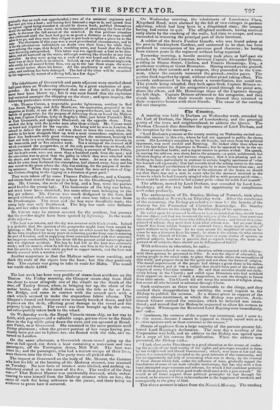The inhabitants of Greenwich and parts adjacent were startled about
balf-past three on Wednesday afternoon, by a great explosion of gun- powder. At first it was supposed that one of the mills at Dartford must have beets blown up ; but it was soon found that the explosion bad occurred amongst the shipping on the river ; and upon inquiry, the following particulars were ascertained— "Mr. Thomas Corsan, a respectable powder lighterman, residing in Red Lion Street, Wapping, and John Matthews, his apprentice, proceeded to the magazine at Erith, in one of Mr. Corsan's gunpowder-boats, and took in ten barrels of gunpowder, for the purpose of delivering them on board the Maltese brig Jose, Captain Cushan, lying in Bugsby's Hole, just below Patrick's Mill, al 'East Greenwich, and opposite Blackwell, on the opposite shore. They reached the brig with the powder soon after three o'clock. Mr. Corsan went es board and inquired for the captain. On being told he was in London, he refused to deliver the powder ; and was about to leave the vessel, when the powder in his boat alongside blew tip with a most tremendous explosion, and threw him backwards with great violence against the mainmast, bruising his had and body in a very shocking manner. The brig was instantly thrown on her beam-ends, and in five minutes sank. Not a vestige of the covered skiff which contained the gunpowder, or of the only person that was on board, the apprentice, was afterwards seen. Thomas Gray, a surveyor of Thames l'olice, and his boat's crew, were not more than a hundred yards from the spot ; and the concussion was so great that the galley in which they were vibrated with the shock, and nearly threw them into the water. As soon as the smoke, which for some time darkened the atmosphere, had cleared away, Gray and his Mtn rowed to the place where the ship was sinking, for the purpose of renders assistance. When they came up., they found the men and a niece of Cap. tam Cnshan, dining to the rigging in a situation of great peril."
They were taken off by some Thames Police.officers, and a Graves- end steam-boat towed then) up in a boat to the Dreadnought hospital- ship. Mr. Corson, the mate of the brig, and a boy, were the parties saved besides the young holy. The boatswain of the brig was below, and must have been drowned ; but some other men belonging to the brig got ashore. Mr. Corson was much disfigured in the face, but escaped without other serious injury, and soon was taken home from the Dreadnought. The mate and the boy were dreadfully hurt ; the young lady was only frightened. The brig has sunk nine fathoms deep, and her sides were blown out.
Mr. Corson says he cannot account for the accident, but guesses that the powder might have been ignited by lightning. In the words of the report- " The heat was intense, and the sky was overcast with black clouds. Indeed it is probable that the ignition of the gunpowder might have been caused by lightning, as Mr. Corson says lie can assign no other cause for the explosion. He has been employed for many years in removing powder from vessels entering the pout of Loudon, and in supplying those outward-bound with that necessary but dangerous combustible, but has never till the present awful catastrophe met with the slightest accident. The boy he had left iu the boat was extremely steady; and Ms master, when he left the boat, saw him in the head of it away from the powder, which was safely packed in copper barrels, and the boat was securely covered with a wooden roof."
Another conjecture is that the Maltese sailors were smoking, and shook the ends of the cigars into the boot : but this they positively deny. The captain was going to take in coals for Malta. The vessel was worth about 4,0001.


























 Previous page
Previous page